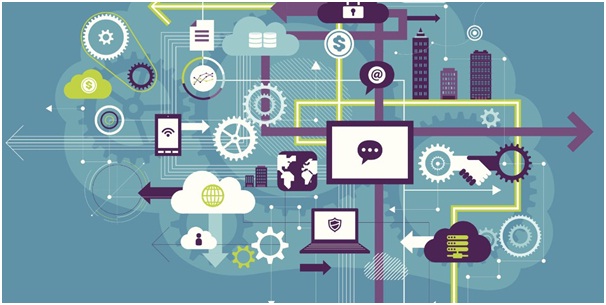Most manufacturing companies are being affected by the following market trends:
- Increased demand from global markets are causing them to build production processes with greater agility and adaptability
- All social media channels are producing massive amounts of data
- Intelligence built into machines through sophisticated sensors and alert devices
- Globalization of supply chain
In this changing manufacturing environment, two major elements – machine to machine (M2M) and Internet of Things (IoT) -are expected to alter the operation ecosystem of any manufacturing firm. All these concepts are making up the fourth Industrial Revolution or Industry 4.0, which describes the merging of traditional manufacturing space with internet technologies and increasing intelligence of devices.
Analysis of electronic equipment industry revealed that adoption of IoT has gone on to become a critical element of smarter manufacturing. It is true that manufacturing companies have been implementing sensors and computerized automation for decades but these ecosystems remained disconnected from IT and operation systems. These systems were individual data silos lacking integration with the existing internal systems. The lack of the integrating system could be due to several reasons,one of them being security issues. While the transition to open network architectures and data sharing of IoT pose challenges, the combination of Big Data, M2M and IoT optimization is expected to bring forth opportunities previously unknown.
The growth of IoT on the consumer side has driven cost reductions in controllers, sensors, and communication through high volume semiconductor manufacturing. As the price of industrial standard smart sensors falls, these solutions are expected to be implemented across all manufacturing equipment, especially in industries which invest heavily in automation, like supply chain logistics. Implementing IoT will benefit the manufacturing sector by collecting data from these sensors and communicate that data across to managers, software systems and multiple strata of supply chain.
Value of IoT in Manufacturing Sector
Industrial revolutions have always been about the next wave of manufacturing process. While the first one was all about the invention and implementation of mechanical help, the second was mass production, initiated by Henry Ford. As per electronic equipment industry, the third brought electronics and control systems to the shop floor. Industry Revolution 4.0 is peer-to-peer communication between products, machines and systems. The basic principle here revolves around essence of IoT and smart manufacturing. This enabled the manufacturers to create intelligent networks along their entire value chain that would help them to communicate and control autonomously across products with minimal intervention from operations. To cite an instance, Bosch, Johnson Controls, and GE all have an IoT based vision where machines predict failures and trigger maintenance processes autonomously. Another instance is of self-organized logistics that responds to alterations in production including shortage of raw materials and bottlenecks. Currently, IoT in manufacturing sector delivers the following new values to any manufacturing chain:
People: IoT manufacturing improves businesses by connecting people through accurate information over the right device at their point of need. This includes suppliers, maintenance partners and even distribution chains. The adoption of smartphones would enable plant managers to access the data needed, including data visualization, at much lower costs compared to previous systems.
Process: Most of the manufacturing companies seek transparency, especially in their supply problems. As IoT becomes more pervasive, manufacturers will deploy third party managed systems which would ensure seamless information flow, faster decisions and greater market responsiveness by helping in integration of both operational devices and business software processes. The stream of communication established between machines would infact enable new levels of automation.
Data: As per research on the electronic industry,the connected devices would produce new types of data. IoT will help in connecting physical items such as sensors, video cameras, actuators and RFID readers – to the Internet and with each other. With the help of Big Data analytics, the data would be collected and analyzed, turning the data into context, which would help both people and machines to take improved decisions.
IoT Affects Business in a Positive Manner
With the help of IoT, industrial businesses, especially manufacturing, utilities and aviation have the ability to transform radically. The smarter manufacturing sectors including electronic equipment industry analysiscan take informed decisions and have operations that are more efficient. IoT, big data analysis and IP networks would also help manufacturers extend their product lifespan while simultaneously optimizing efficiency and minimizing energy consumption.
With the onset of Industry 4.0, a drastic increase in the manufacturing complexity is expected to occur, especially because organizations will now start thinking about incorporating new innovationsto give them the competitive advantage. So, it can be safely concluded that IoT will fundamentally change how products are being invented, designed, manufactured, shipped and sold. Integration of IoT is expected to let the manufacturers become more efficient, improve worker safety and thereby increase their return on assets. As the manufacturing sector masters this dynamic to gain a variety of opportunities for revenue growth and cost savings, it will also help them to leverage their knowledge of the product to provide a wide array of value added services.

